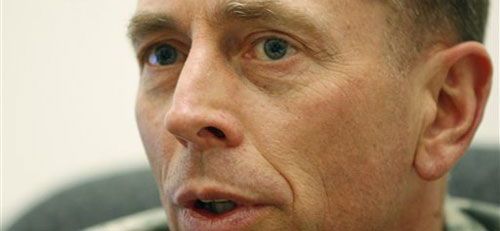
AP

AP
Dept. of Misdirection: With Iraq a Disaster, GOP Goes Crazy Over a Newspaper Ad




Does anybody really believe the problem with the war in Iraq is too much questioning of those in authority, too much bluntness, and not enough deference to those who have been in charge of the war for the last four years?
That's apparently the feeling of all the conservative talk-show hosts and GOP presidential candidates who came down with the vapors over the MoveOn ad that had the temerity to question Gen. David Petraeus. Tens of thousands of dead civilians, nearly 4,000 dead American soldiers, half a trillion dollars spent, and the squandering of America's moral authority -- none of that seems to have ruffled their feathers very much. But the ad? Now that has got them royally steamed.
Rudy Giuliani is up in arms, railing against "character assassination on an American general who is putting his life at risk." John McCain thinks "MoveOn.org ought to be thrown out of this country." Even Don Rumsfeld popped his head out of his spider hole to blast the ad.
It's the political version of the old lawyer's axiom: When the law is against you, argue the facts. When the facts are against you, argue the law. When both are against you, attack the plaintiff. And when the war is an unmitigated disaster, the facts on the ground are against you, and your only plan for the future is 'more of the same,' go crazy over a newspaper ad.
I experienced a similar thing in 2002, when we produced a pair of edgy TV ads drawing a link between America's dependence on foreign oil and national security (a point that has since become the conventional wisdom, even adopted by oilman George Bush). But at the time, conservatives raised the roof, "how dare yous" filled the air, and we were accused of having gone too far in making our point.
Now it's déjà vu all over again. Was the MoveOn ad blunt? Yes. Did it go for the jugular? No doubt. But while the way it chose to make its points can be debated, the accuracy of those points cannot.
Does anyone really doubt why the president hid behind Petraeus' medals and sent him on a week-long talk-show tour to sell a policy he could no longer peddle himself?
As George Lakoff wrote here in the Huffington Post, "Bush took advantage of certain conventions of etiquette and politeness when he sent Petraeus to testify before Congress. Those conventions hold that one does not criticize the symbolic stand-in for the military, even when the uniform-wearing stand-in is on an overt political mission that is at the heart of the administration's continuing betrayal of trust."
So, yes, betrayal is certainly the operative word. And it's good to see that MoveOn is continuing to broaden the discussion with two new ads -- one highlighting Bush's "betrayal of trust," and one highlighting Giuliani's.
By repeatedly politicizing the military -- while militarizing our politics -- Bush has betrayed those in uniform. Again and again. As for Giuliani, who couldn't even be bothered to attend the Iraq Study Group meetings, he's wasted little time running a campaign ad featuring the General, joining Bush in hiding behind Petraeus' medals (thankfully Petraeus has a lot of them, because it's going to get awfully crowded back there).
Political policy should always be questioned and debated. And if a uniformed soldier is shoved into the public spotlight to front for a policy, then, yes, he should also be questioned and debated. (In the case of the General, he's been so politicized that the White House had Ed Gillespie "hard wired" into Petraeus' prep sessions.)
Then, of course, there's the fact that many of Petraeus' numbers were (excuse my impoliteness, General) flat-out wrong. The Washington Post and the Los Angeles Times have documented how the White House and Petraeus used questionable methodology to arrive at their cherry-picked stats, so the General's numbers for civilian violence varied widely from the number produced by Congressionally-mandated studies.
And, as Spencer Ackerman and Ilan Goldenberg point out, Petraeus' conclusions about "sectarian violence" leave a lot to be desired. Yes, in certain areas of Baghdad violence has gone down, but that's because of the completeness of ethnic cleansing in those neighborhoods. Which means that this is a decrease in violence that's actually a harbinger of more violence to come, not less.
And it turns out Anbar isn't such a glittering success.
In any case, the purpose of the surge wasn't to prove that more troops could increase security; it was that the increased security produced by the surge would lead to political conditions in which increased security could be had without US troops. And that clearly hasn't happened.
If Giuliani, McCain, and all the rest of those who got their knickers in a twist over the MoveOn ad really want to make the case for following Bush over the Iraq cliff, they should drop their faux-indignation about whether "Betray Us" was a well-chosen play on words and debate the facts.
Thankfully, there's at least one member of the Republican Party who is willing to truly stick up for the military. This is from last Friday's Real Time with Bill Maher appearance by Sen. Chuck Hagel:
Maher: "Isn't a dirty trick on the American people when you send a military man out there to basically do a political sell-job?"
Hagel: It's not only a dirty trick, but it's dishonest, it's hypocritical, it's dangerous and irresponsible. The fact is this is not Petraeus' policy; it's Bush's policy. The military is -- certainly very clear in the Constitution -- is subservient to the elected public officials of this country... but to put our military in a position that this administration has put them in is just wrong, and it's dangerous."
Someone should put that in an ad.





























Posted September 17, 2007 | 07:04 PM (EST)